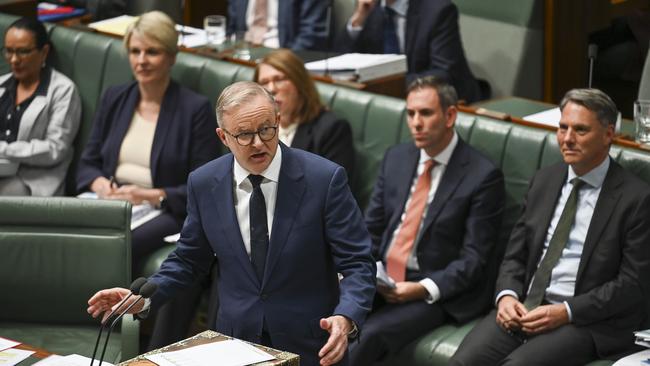
The government wants the power to take control of legitimate, legal and properly-negotiated contracts and give a government body the power to change those contracts in a way that suits the agenda of the government and/or its major supporters.
An early area of attack will be the mining and minerals processing industry, at the very time our Prime Minister has negotiated a brilliant deal to attract vast amounts of local and American money to develop our minerals processing to promote renewable electricity generation and reduce China’s dominance in that area.
Accordingly, by attacking the pillars of our commercial society as applied to mining and minerals processing, the current government threatens the future potential of the nation.
The government’s radical plan will of course have an enticing title and calming advocacy, but no smoke screen can disguise the dangerous precedents they are creating.
The legislation is currently in the consultation stage.
Initially, most industry bodies were scared of annoying the government so they put forward stances that did not oppose the radical scheme but requested that their industry should not be subject to these contract destroying powers.
Now the sheer horror of what is proposed has hit home and the Master Builders and Minerals Council of Australia have moved onto the attack and others will follow.
The government’s proposed powers to change legitimate contracts involve declaring a contract to be ‘employee-like’ and then bringing that contract into the industrial relations system to be regulated by the Fair Work Commission.
Once parliament gives a government the power to treat a legitimate commercial contract for services as if it were an employment contract, it means that a core, primary legal and public policy threshold is crossed.

Australia has some of the world’s clearest rules to determine whether a contract is a sham arrangement disguising employment, or is in fact a genuine contract.
Accordingly, the legislation has no purpose if it targets so-called sham contracts where the law already classifies the arrangement as an employee relationship.
The real aim is to attack legitimate service contracts. And once legitimate contracts can be amended by a government body, then there is no restriction on the power being extended to almost the entire Australian business community that relies on services contracts.
The proposed legislation is currently in the consultation stage, but it is clear that it proposes to smash properly-negotiated, lawful contracts by later declaring them ‘employee-like’.
The Albanese government proposal flies in the face of rulings of three pillars of our society – our undertakings to the International Labour Organisation, the clear contract rules set out by the High Court of Australia and the authority of the Australian Competition and Consumer Commission.
To undermine these pillars, the government will legislate to give it the power to declare an Australian commercial services contract that complies with the rules of contracting as an employment contract.
The government initially claimed it would restrict this declaration power to so called ‘gig workers’ (ride-share etc).
Those ‘gig workers’ who have loose arrangements and have not been properly contracted don't require new legislation because the rules are already set out.
But it’s now clear the government is prepared to destroy the flexibility that comes out of labour hire and other contracting. Under these legitimate contracts, service providers like engineers receive agreed payments that are often linked to individual flexibility. Everyone wins.
BHP now realises it will be a key target and says if its contracts are forcibly amended to remove flexibility and an additional amount of money forcibly added to the contract, then the final cost could be around $1.3bn. Similar attacks will be launched on the home building industry.

Australia is in desperate need of the construction of new dwellings, and we are on the edge of vast amounts of investment in mining and mineral processing.
This legislation will increase the shortage of houses and make it less attractive to develop minerals in Australia when compared with the US and other places.
It is bizarre that at the same time as the Prime Minister negotiated substantial US investment in Australia, his is employment minister is creating uncertainly by challenging pillars like the High Court, the International Labour Organisation and the ACCC.
The High Court set out clear contracting rules, which the government now wants to dismantle.
The High Court declared in the Personnel case its view on employment and contracting.
“It is the task of the courts to promote certainty with respect to a relationship of such fundamental importance. Especially is this so where the parties have taken legitimate steps to avoid uncertainty in their relationship. The parties’ legitimate freedom to agree upon the rights and duties which constitute their relationship should not be misunderstood” the court stated.
The government’s ‘employee-like’ proposal will replace the High Court, created certainly with uncertainty.
The proposed legislation provisions could breach Australia’s obligations to the International Labour Organisation that ensure employment law and regulations do not interfere with commercial contracts.
The ILO declares: “National policy for protection of workers in an employment relationship should not interfere with true civil and commercial relationship”.
The ACCC and the Fair Work Commission will both be required to regulate commercial contracts that have been declared ‘employee-like’, but each with different and opposing public policy objectives.
The ACCC aims to prevent collusion over pricing and ensure competition.
The FWC to facilitate price collusion, thereby creating the circumstances for anticompetitive behaviour.
Just imagine what President Joe Biden will say to Prime Minister Anthony Albanese when he learns what’s happening to commercial pillars Down Under.








The Albanese government’s so-called ‘industrial relations’ measures will set rules that give it unprecedented powers to change the way personal services contracting is conducted in Australia.